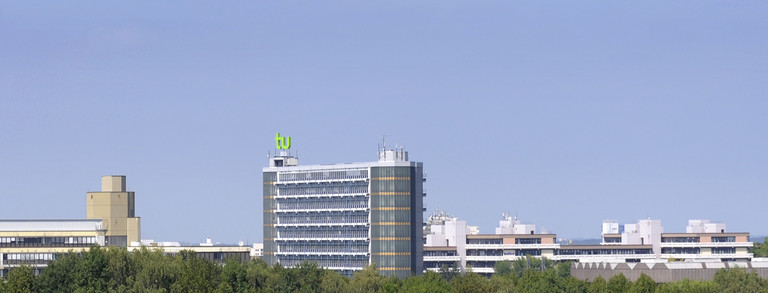BMBF Funds TU Dortmund University’s Research at CERN with 3.7 Million Euros
- Particle Physics
- Top News
- Research
- Press Releases

At CERN, the world’s largest center for particle physics, scientists from all over the world are trying to find new particles. In addition, they are investigating the properties and interactions of already known elementary particles in order to solve previously open questions in physics. Around 40 physicists from TU Dortmund University are involved in two of the four major projects that are running on the Large Hadron Collider (LHC) particle accelerator and in the accompanying development of theoretical models. This research is funded by the Federal Ministry of Education and Research (BMBF) with 3.7 million euros from 2019 for 2.5 years.
Scientists from the Faculty of Physics of TU Dortmund University are participating in the ATLAS experiment under the direction of Professor Kevin Kröninger, and their colleagues led by Professor Bernhard Spaan are working on the Large Hadron Collider beauty (LHCb) experiment. The objectives of both experiments are to test the Standard Model and to search for new phenomena – albeit with a different focus: The ATLAS researchers are searching for previously unknown forces and elementary particles. The LHCb experiment focuses on precision measurements and the search for rare decays. The work of the physicists from TU Dortmund University is supported by theoretical investigations of the processes taking place at the LHC. These accompanying investigations are carried out by the third working group of TU Dortmund University headed by Professor Gudrun Hiller. Theoretical models and analyses are necessary to interpret the data.
Regular on-site research at CERN
BMBF funding is essential for the maintenance and operation as well as for the expansion and further development of the experiments. The infrastructure that researchers use for their work must be constantly adapted to the current requirements of the projects. It is also essential for the work of the experimental particle physicists from TU Dortmund University that they conduct regular on-site research at CERN. These stays are also funded by the BMBF.
The particle accelerator LHC will not be in operation until around the end of 2020 due to conversion work aimed at improving the functionality of the facility. When the LHC is operational again, the accelerated nuclear constituents will collide at an energy of 14 teraelectronvolts – more powerfully than ever before. “The increased center-of-mass energy opens up new possibilities for us to visualize previously unobserved phenomena and new elementary particles – if these exist,” said Professor Kevin Kröninger.
The research of the Dortmund scientists does not pause during the interruption in operation of the particle accelerator. “We are busy evaluating the data we have collected over the past few years. In addition, we have to further develop or modify our experiments in order to make the best possible use of the functionalities of the renewed LHC from 2021,” said Professor Bernhard Spaan.




![[Translate to English:] Partner Four hands are holding the green logo of TU Dortmund University](/storages/tu_website/_processed_/1/d/csm_Partner_Nicole_Rechmann_KW_40b35bb3fd.jpg)




![[Translate to English:] Forschung An apparatus with tubes in a laboratory](/storages/tu_website/_processed_/0/c/csm_Forschung_Juergen_Huhn_cbd34afd6d.jpg)
![[Translate to English:] Studium Five students are sitting in a lecture hall. They are talking to each other.](/storages/tu_website/_processed_/c/9/csm_Studium_FelixSchmale_81d94adc86.jpg)






